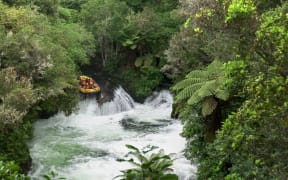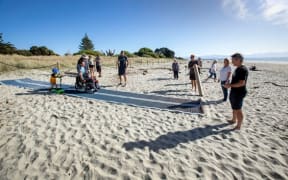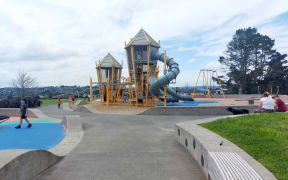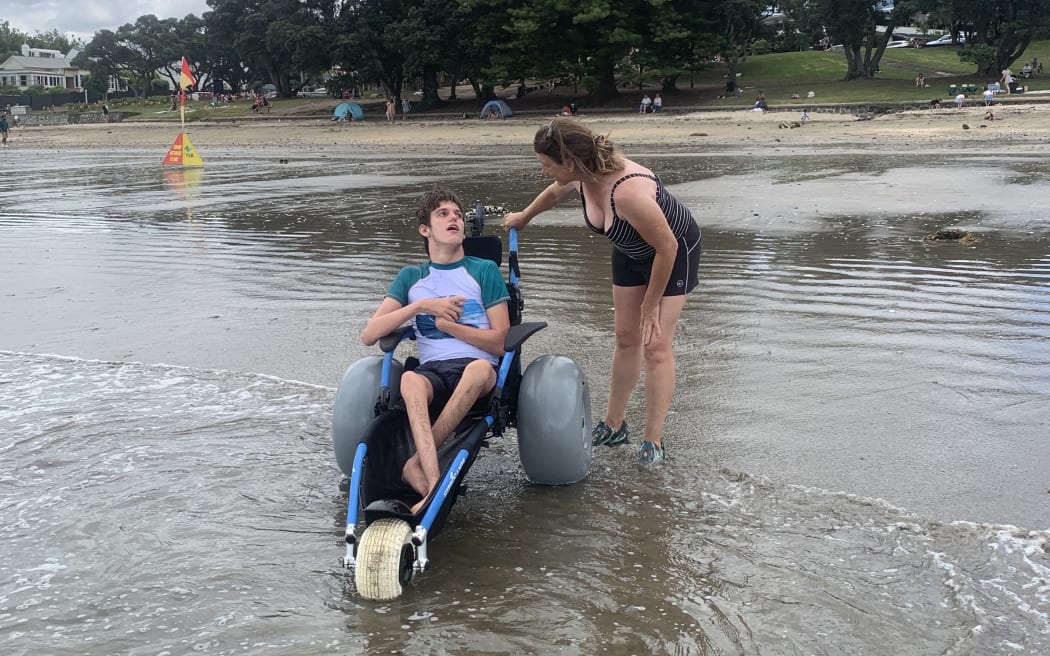
Finlay and Kimberly Graham at Takapuna Beach in Finlay’s community-funded beach wheelchair. Photo: Supplied / Kimberly Graham
* This story had been updated to correct the spelling of two names.
The beach day is a Kiwi classic - but for people in wheelchairs, accessible beaches are few and far between.
Wheelchair users and their families are calling on the government to invest in making public places, like beaches, accessible to everyone.
Travelling anywhere in or out of Auckland requires weeks of preparation for Kimberly Graham, whose son Finlay, has cerebral palsy.
On a hot day, she heads to Takapuna beach - one of the only beaches in Auckland they can access.
"Yesterday, I thought, 'Gosh it's a hot day, Finlay's miserable'. So we went to Takapuna Beach," she said.
Finlay has a beach wheelchair, and they need a space to transfer him into the chair at the beach.
At Takapuna, there's a Changing Place - a fully accessible public bathroom for wheelchairs users who need caregivers to help transfer out of their chairs.
The Changing Place at Takapuna was the first of its kind in Auckland.
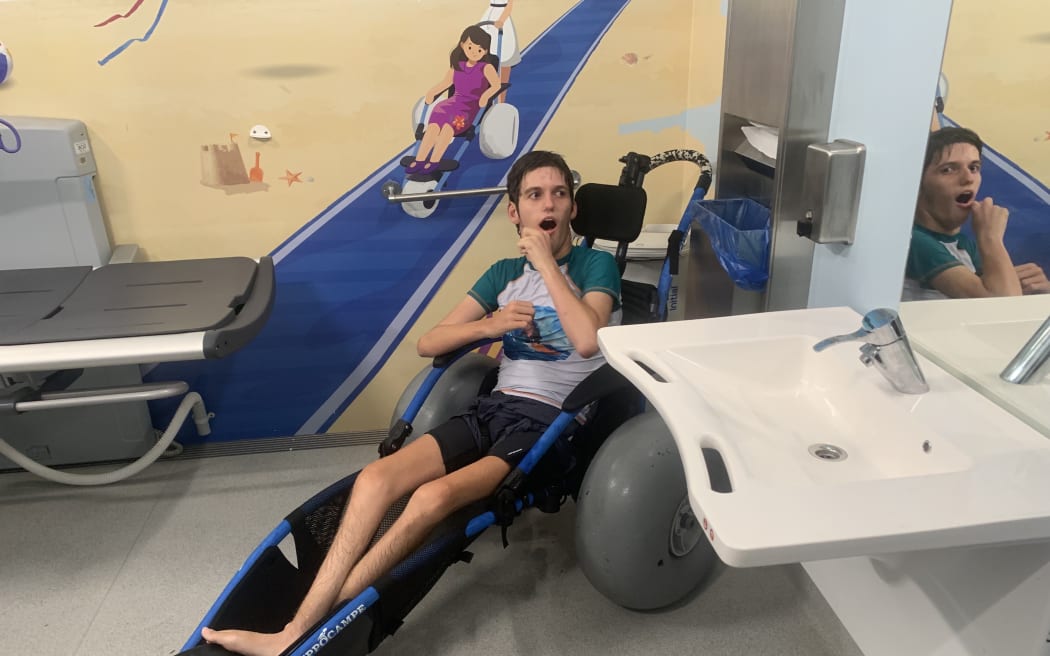
Finlay in the Changing Places room Photo: Supplied / Kimberly Graham
"It's fabulous," Graham said. "It's right there. I was able to wheel the power chair in, wheel the beach wheelchair with the big wheels into there, hoist Finlay, change Finlay on the change bed into his swimming gear, towel him off and shower him off afterwards, transfer him back into the beach wheelchair, and enjoy the beach with everyone else."
Changing Places is a charity that works with councils and businesses to build fully accessible bathrooms for people with complex disabilities.
Its founder Jenn Hooper estimated there were 20,000 New Zealanders who relied on bathrooms like these to leave the house.
"If you imagine, if the only toilet and bathroom that exists in all the world that you can use, is the one that's in your house, how often would you go out?" Hooper said.
Changing Places are designed for adults and children who need caregivers' help to get out of their wheelchairs - people like Hooper's daughter, Charley.
"We're talking people like my daughter, who will live her life forever in nappies, who can't hold her head up, let alone move a hand. We're also talking really severe dementia patients, people that need a caregiver either side of them to help them onto the toilet," she said.
"Without these facilities, they'd all stay at home, basically."
There are seven Changing Places in New Zealand: Two in Auckland, three in Hamilton, and one each in Mount Maunganui and Hastings.
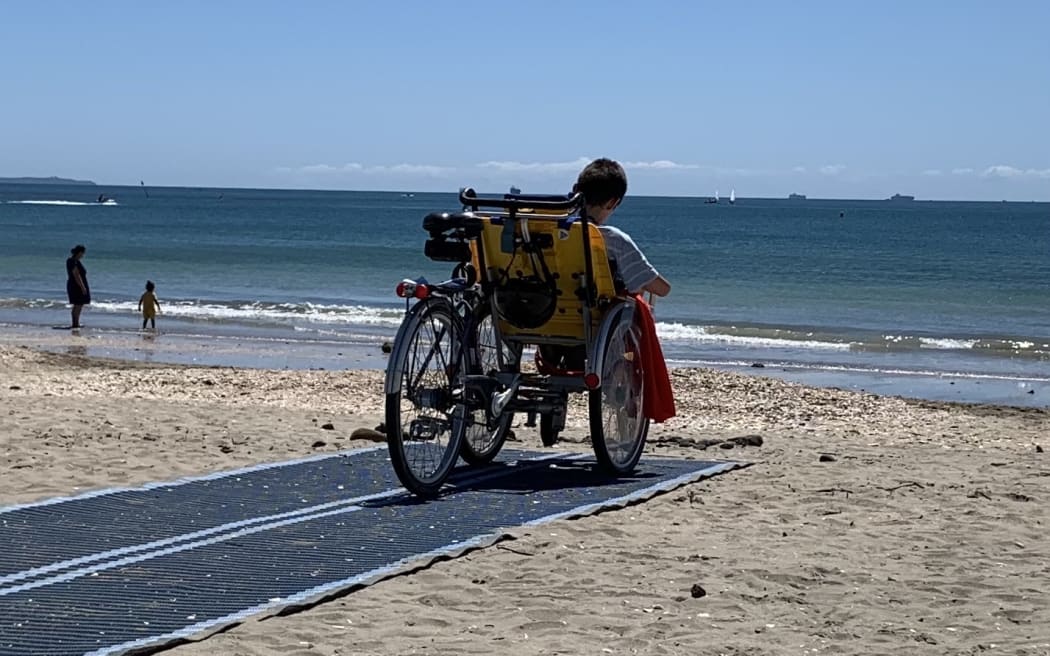
Finlay Graham on a wheelchair bicycle on a beach mat at Takapuna beach. Photo: Supplied / Kimberly Graham
But somewhere to change is only the first hurdle.
Rachel Peterson has used a wheelchair her whole life, and was determined this summer to get into the sun onto the sand and into the waves.
"It's a Kiwi thing to do, it's a free thing to do, it's a way to exercise, be with your family, and connect with nature and soul or whichever you want to put it. And it's not available to a huge percentage of our population, just doesn't sit well with me," she said.
Peterson was surprised to find the surf club at Red Beach, where she lives, had a beach wheelchair free to use.
A beach wheelchair can be taken on the sand even without a mat on the beach.
"I have lived in Red Beach for five years, but I didn't know about it. Red Beach has a beach wheelchair and well-trained lifeguards and their surf lifesaving clubhouse is actually fully accessible with a lift and showers and parking and it's just phenomenal."
Reaching the water for the first time in five years was an amazing moment - one that should have happened sooner, she said.
While not all beaches could be accessible, geographically, Peterson wanted to see a beach with a beach wheelchair available in all four corners of Auckland.
"In this day and age, with the amount of money that we pay in rates and taxes, and even from an ethics and human rights point of view as well as what's right, it's just crazy to me that there's not more will politically, or council-wise, to do a bit more about this."
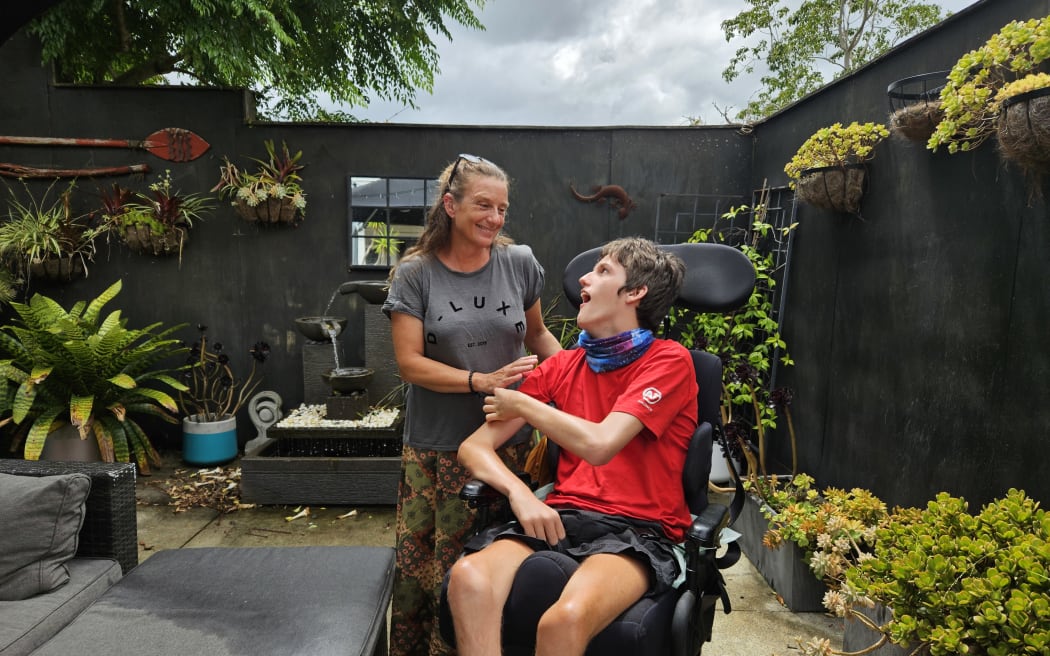
Kimberely Graham, and her son, Finlay, who has cerebral palsy and uses a powered wheelchair. Photo: RNZ / Maia Ingoe
Back in Takapuna, Graham said Finlay's beach wheelchair was funded by the community, and without it, he would not be able to reach the water.
"They're not cheap. What we would like to see more of at some of our more popular beaches, is that they not only have a changing place, but a selection of beach wheelchairs near the lifeguards."
Without a beach wheelchair, wheelchair users need a beach mat: A rollout mat that create a sturdy path to the water for wheelchairs.
An Auckland Council spokesperson said the council operates beach mats at Mission Bay and and at Palm Beach on Waiheke Island, from Labour Weekend until Easter, but they do not provide beach wheelchairs.
There is a beach mat at Takapuna beach, operated by Yes Disability.
Graham said they were unable to rely on the beach mat at Takapuna, as it was often moved with no notices posted to the public.
"There's supposed to be a beach mat at Takapuna, but it's just in an awkward area where the storms can damage where it is," she said.
"Information like that is really necessary. So if you were someone coming from across the other side of Auckland, the difficulty, and challenges, and extra work it takes to get from your home to a place for an activity. And then to turn up after all that and then find the beach mat is not on the beach, is another barrier."
Graham said New Zealand's accessibility was lagging behind other countries, and she wanted the government to invest in a network of changing places.
"Can you imagine the freedom that would bring to people? It's not a nice to have, it's an essential thing to have."
Hooper pointed to the UK, who has 2000 changing places, which she said was still not enough.
"Now in New Zealand, we've only been going six years, and we've got seven units. But that's what happens when you have government backing and decent resourcing and funding, compared to not," she said.
Hooper wanted to see a network of Changes Places accessible bathrooms within a 10 to 15 minute drive of each other.
"It seems like a lot. But how many McDonald's or Countdown supermarkets can you get to within a 10- or 15-minute drive of anywhere? Loads. If you were told your only public toilet was a 10- to 15-minute drive away ... for us, that'd be a dream come true."
Families like the Grahams want to enjoy a summer beach day just like everyone else - they say accessible bathrooms, beach wheelchairs and mats, give them that freedom.
